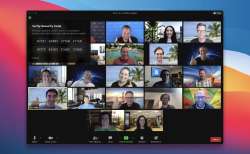90% feel video calls help them combat loneliness: Report
Around 90 per cent of respondents feel that video calls have helped them to combat feelings of loneliness amid the pandemic, a report said on Tuesday.

Around 90 per cent of respondents feel that video calls have helped them to combat feelings of loneliness amid the pandemic, a report said on Tuesday. The survey conducted by video-conferencing platform Zoom in collaboration with Qualtrics Research also revealed that 50 per cent of respondents have used video calls for business purposes.
And over half of them (52 per cent) appreciate having a choice between virtual and physical meetings as they feel "hybrid workplaces will save time and provide convenience".
"India adjusted and adopted video call platforms rapidly. It wasn't just a shift in technology but in behavioural mindset as well," Sameer Raje, General Manager & Head of India, Zoom, said in a statement.
"As we look forward to a hybrid world, Zoom is ready to empower organisations with solutions that ensure physical safety and virtual security of their hybrid workforce. We are excited to see the role of video unfolding in the future," Raje added.
In India's sector-specific dive, the report finds that the most common use of video calls are seen in education (72 per cent), celebration/social gatherings (62 per cent), events (59 per cent), entertainment (58 per cent), business (50 per cent) and a sector that gained prominence during the pandemic -- telehealth (42 per cent).
More than 90 per cent of respondents feel that virtual and remote activities have helped them stay connected with others during this period, while 75 per cent said that these activities helped to improve emotional health, the survey revealed.
When it comes to business travel, 39 per cent expect to travel more post-pandemic, while 37 per cent expect less travel than in the pre-Covid era.
The company said that it emerged as one of the top video calling apps in India, having high levels of awareness (85 per cent) and usage (72 per cent) and 61 per cent of respondents using it over seven days.
The survey included 7,689 respondents from the US, the UK, Mexico, Brazil, France, Germany, Japan, India, Singapore and Australia from March 15 to March 26, 2021.